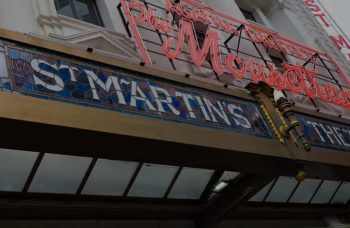Every year, the National Theatre School in Montreal fosters exceptional acting talents and sends them out into the world of their craft. Not only does this afford the students their opportunity to show their abilities to the world, but the programming for the final year students often evokes a pertinent young voice on current issues. Two years ago the season included The Observed Flight of Birds– a collective creation piece helmed by Halifax’s 2b theatre centred around the tense North American political climate- as well as What Rough Beasts– a challenging piece by NTS alumni Alice Abracen, dealing with the conditions and consequences of male violence and shooters. And while not sharing the same era, the National Theatre School’s Nell Gwynn still holds up a mirror for very current issues.
Nell Gwynn, written by Jessica Swale and first premiering at Shakespeare’s Globe in 2015, is inspired by the life of the play’s namesake, who was not only one of the first actresses to grace the stages of Restoration-era England but also was the mistress of King Charles II. The plot highlights her “rags-to-riches” lot in life, from a former prostitute and fruit vendor, to the scandalous position of a pioneering woman on stage, to the lover of the king. The action of the play largely takes place in a theatre, and much of the scenes serve as a comedic meta-analysis of the form that maintains an awareness of the literal space and presence of the audience. And while afloat with lightness for the majority of the time, this production still holds its ground of importance and bares its teeth with purpose to great effect. The repulsion and novelty the world of the play has towards the assertive Nell Gwynn is not so different from women today challenging male-dominated fields.
The titular role is traded off night-to-night, and it was Espoir Segbeaya who donned the fiery mantle the night in question, giving a jovial and self-assured weight to the icon. Segbeaya easily flowed from commanding and beaming in the plays within the play, to a quick-witted cleverness in her encounters with the many blustering men who fell short of her prowess, but all are underpinned by a genuine caring that is most evident in interactions with the other women of the show, especially with her sister, who Erin Mackey fills with a deeply felt concern (and who shares the role of Nell Gwynn with Segbeaya). The romance between Gwynn and King Charles II is brimming with interesting layers, Patrick Forrest displaying the constant drain of his royal title that is equally matched in his instinctual desire for sex and merriment, who is not without his own posturing and calculating, making for a very human regent that touches with his true love for Gwynn. All performers supported the regal atmosphere of the court and the creative energy of the playhouse well, but special note of Savion Roach and Ray Jacildo should be made, the former giving a chillingly cool vindictiveness as the king’s attendant, Lord Arlington, and the latter as an unceasingly popping firecracker of the old guard of male actors as female roles, Edward Kynaston.
The flow of the play from scene to scene and location to location is smooth enough, but the lack of attention to the passage of time leaves a lot to be desired. In the first act, days and weeks move by in an understandable manner, but in the second act there are numerous jumps of months and apparent years with zero reflection of this in design or performance, making for distraction from some pivotal moments. This blurriness aside, the performance is well balanced in its general humour and sweetness with punctuations of guilt, classism, and sexism. Swale’s text parallels many issues that female performers still face today, as well as women in countless other fields; despite Gwynn breaking ground with the obvious choice of women representing themselves on stage, her push for realistic characters with their own desires and minds is met with confusion and the expectation of sexual objectification. Evident in the MeToo movement and recent works such as the film Bombshell, there is an ongoing need to hold those in positions of power accountable for curating these toxic environments for women as well as enlightening the public about these struggles of feminism. The play is an easily accessible presentation of these ideas and its importance is highlighted by the fact that the climate of the acting world that these students are going into is currently coming to terms with many of the same issues.
There is often an argument as to whether Shakespeare and even modern plays with antiquated settings are as relevant to put on stage anymore. The speech is less understandable, the plots too grandiose, the content not relatable. But National Theatre School’s Nell Gwynn shows not only a well-balanced approach presented believably by young thespians, but it also shows us that the exploration of historical figures can still teach us much about our present.





